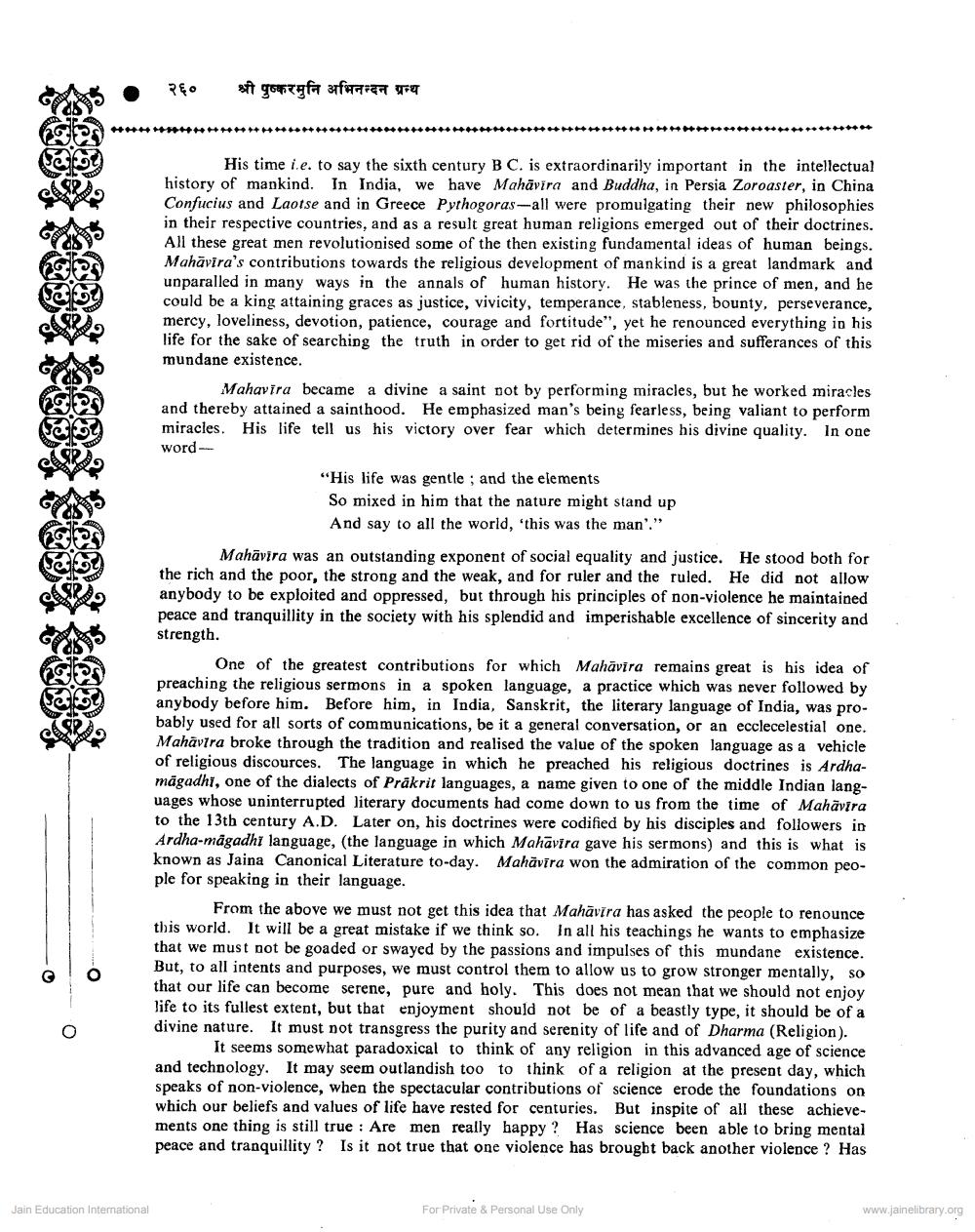Book Title: Philosophy of Mahavira Author(s): Satya Ranjan Publisher: Z_Pushkarmuni_Abhinandan_Granth_012012.pdf View full book textPage 2
________________ Ght. २६० श्री पुष्करमुनि अभिनन्दन ग्रन्थ +++++++++++ +++ ++++++++++++ ++++ ++ ++++++++++++++++ ++ +++ ++++++++++ ++++ +++++++ + + + His time i.e. to say the sixth century BC. is extraordinarily important in the intellectual history of mankind. In India, we have Mahāvira and Buddha, in Persia Zoroaster, in China Confucius and Laotse and in Greece Pythogoras--all were promulgating their new philosophies in their respective countries, and as a result great human religions emerged out of their doctrines. All these great men revolutionised some of the then existing fundamental ideas of human beings. Mahavira's contributions towards the religious development of mankind is a great landmark and unparalled in many ways in the annals of human history. He was the prince of men, and he could be a king attaining graces as justice, vivicity, temperance, stableness, bounty, perseverance, mercy, loveliness, devotion, patience, courage and fortitude", yet he renounced everything in his life for the sake of searching the truth in order to get rid of the miseries and sufferances of this mundane existence. Mahavira became a divine a saint not by performing miracles, but he worked miracles and thereby attained a sainthood. He emphasized man's being fearless, being valiant to perform miracles. His life tell us his victory over fear which determines his divine quality. In one word “His life was gentle ; and the elements So mixed in him that the nature might stand up And say to all the world, this was the man'." Mahāvira was an outstanding exponent of social equality and justice. He stood both for the rich and the poor, the strong and the weak, and for ruler and the ruled. He did not allow anybody to be exploited and oppressed, but through his principles of non-violence he maintained peace and tranquillity in the society with his splendid and imperishable excellence of sincerity and strength. One of the greatest contributions for which Mahāvīra remains great is his idea of preaching the religious sermons in a spoken language, a practice which was never followed by anybody before him. Before him, in India, Sanskrit, the literary language of India, was probably used for all sorts of communications, be it a general conversation, or an ecclecelestial one. Mahavira broke through the tradition and realised the value of the spoken language as a vehicle of religious discources. The language in which he preached his religious doctrines is Ardhamāgadhi, one of the dialects of Präkrit languages, a name given to one of the middle Indian languages whose uninterrupted literary documents had come down to us from the time of Mahāvīra to the 13th century A.D. Later on, his doctrines were codified by his disciples and followers in Ardha-magadhi language, (the language in which Mahāvira gave his sermons) and this is what is known as Jaina Canonical Literature to-day. Mahavira won the admiration of the common people for speaking in their language. From the above we must not get this idea that Mahavira has asked the people to renounce this world. It will be a great mistake if we think so. In all his teachings he wants to emphasize that we must not be goaded or swayed by the passions and impulses of this mundane existence. But, to all intents and purposes, we must control them to allow us to grow stronger mentally, so that our life can become serene, pure and holy. This does not mean that we should not enjoy life to its fullest extent, but that enjoyment should not be of a beastly type, it should be of a divine nature. It must not transgress the purity and serenity of life and of Dharma (Religion). It seems somewhat paradoxical to think of any religion in this advanced age of science and technology. It may seem outlandish too to think of a religion at the present day, which speaks of non-violence, when the spectacular contributions of science erode the foundations on which our beliefs and values of life have rested for centuries. But inspite of all these achievements one thing is still true : Are men really happy? Has science been able to bring mental peace and tranquillity? Is it not true that one violence has brought back another violence ? Has Jain Education International www.jainelibrary.org For Private & Personal Use OnlyPage Navigation
1 2 3
